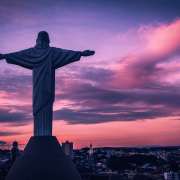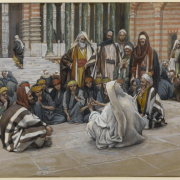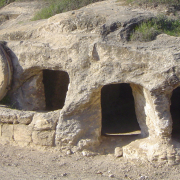Why Do We Need a Messiah?
All you have to do is flip through the latest news to see that all is not right in the world. The nature of news, of course, exaggerates the negative side of life to boost ratings. But this exaggeration cannot hide how corrupt this world has become. As we work to make the world a better place, there seems to be a force of evil working against it. God’s creation does not seem to be experiencing the goodness and shalom that he designed it to have.
You know this. You feel it. There is a nagging sense that the world needs to be repaired, but that is almost too vast a concept to comprehend. The same sense nags us about things that hit us close to home. In our quiet moments, we recognize that our communities, our families, and even we ourselves need repair. Something has gone wrong.
Our Broken Relationship with God
The reason you have this feeling that all is not right is because of a catastrophe that happened thousands of years ago. When God created the world, life was good and in harmony. Then our first parents disobeyed God (Genesis 3) when they ate of the fruit of the tree of good and evil. God said, “Behold, the man has become like one of us in knowing good and evil.” (Genesis 3:22) And with that, Adam and Eve were cast out of the garden, catastrophically breaking the harmony between God and humans.
Doing anything that goes against God’s holiness is called sin. You know what it feels like when a friend betrays your trust. Somehow your relationship has to be repaired so you can be close friends again. Because God is holy and perfect, repairing the relationship between people and God requires a mediator, someone who acts on behalf of humans and can also stand before our holy and righteous God. Moses served as Israel’s first great mediator during the Exodus (Exodus 20:18–21), and we need one today.
Limited, Temporary Means of Dealing With Our Sin
During Bible times, this mediation was performed at the Temple altar where the priests offered sacrifices for sins. The priests were kept busy, never resting, because the offerings were only temporary. Even the great prophet Isaiah knew the Temple sacrifices could not fully restore a relationship of harmony with God.
If we were to come into the presence of God like Isaiah did, we would say exactly what he did in chapter 6: “Woe is me! For I have become undone; for I am a man of unclean lips, and I dwell in the midst of a people of unclean lips; for my eyes have seen the King, the Lord of hosts!” (Isaiah 6:5) We cannot come into the presence of God because God is holy and righteous and we are not. In Isaiah’s case, he was protected only because of divine intervention to take away his sin (Isaiah 6:7).
Like Isaiah, we need divine intervention to take away our sin. Isaiah looked forward to the day that a redeemer would take our sins upon his shoulder and make us pure in God’s eyes (Isaiah 53). This redeemer, our Messiah, is Jesus who is the mediator between humans and God. Jesus is able to relate to mankind as our perfect representative, standing before the God of Abraham, Isaac and Jacob on our behalf.
Wouldn’t it be nice to have a harmonious relationship with God? We all need a restored relationship with the holy God of Israel, but that does not come naturally. We sense a separation from him and yearn for our transgressions to be erased so that we no longer have, as Isaiah puts it, “unclean lips.”
Ultimate Mediation Through Messiah
The prophets tell us about the coming Messiah, who is central to Israel’s restored relationship with God. For example, Isaiah wrote, “’And a Redeemer will come to Zion, to those in Jacob who turn from transgression,’ declares the Lord.” (Isaiah 59:20) This Redeemer is Messiah.
We see in Isaiah 53 that the Messiah will be “pierced for our transgressions,” “crushed for our iniquities,” and he will carry our sorrows and grief. Because each one of us has, like sheep, turned away from God, “the Lord has laid on him the iniquity of us all.” (Isaiah 53:4–6) The Messiah takes the penalty for our transgressions so that our relationship with God is restored.
Other Roles Fulfilled by Messiah
Some of our sages said that the Messiah will be a king, while others expected a suffering Messiah. One of the great sages, Maimonides, said that one day there will be a dynamic Jewish leader, a direct descendant of the Davidic dynasty. He will gather Jews from all over the world and every nation will recognize him. Jesus has the Davidic lineage that is to be expected of the Messiah. He also said, “My kingdom is not of this world.” (John 18:36) He is king today, and one day he will return to Jerusalem to restore the kingdom to Israel (Acts 1:6–7). In that day, everything written about the Messiah by Maimonides will be accomplished, and much more as well.
Yeshua’s central purpose was to bring repair to Israel and the nations. We read in Matthew about his leadership as he expounded the scriptures like Moses (Matthew 5–7), how he healed the sick, and how he challenged the Temple leadership for straying from God’s commands.
Matthew, Mark, Luke and John also write about how Yeshua died for us and how he was a perfect offering for our transgressions. This was all foretold in Isaiah 53:5 where it says, “he was wounded for our transgressions, he was bruised for our iniquities: the chastisement of our peace was upon him; and with his stripes we are healed.”
Why We Need Messiah
We need a Messiah to take away our sins so we can have fellowship with God and rest in the peace that our hearts yearn for with him. When you see that Yeshua is the promised Messiah and know that he suffered, died, was buried and God raised him from the dead for you, then your relationship with God will be repaired. Your nagging sense that you are not right with God will go away, like a heavy weight lifted from your shoulders. Then, even though the world is still not quite right and filled with negativity, your relationship with God will be repaired. That is good news indeed!





 Public Domain
Public Domain Brian Crawford
Brian Crawford
